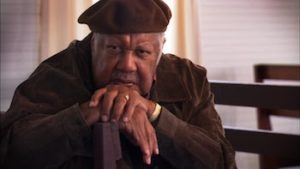
Ernest Gaines
Ernest J. Gaines was born on this date in 1933. He was a Black writer and educator.
He was born on River Lake Plantation in Pointe Coupee Parish near New Roads, Louisiana (which he would call Bayonne Parish in his novels). Gaines was the oldest of 12 children and was raised by his Aunt Augustine. Gaines's first six years of school were in a plantation church, where a visiting teacher taught five to six months a year, depending on when the children were needed to work in the fields.
Schools for Black children didn't continue past the eighth grade, and when he was 15, Gaines moved to San Francisco to join his mother and stepfather, who had gone there a few years before. It was in San Francisco that Gaines first entered a library, which up until then had been reserved for whites. Gaines says, "I had a choice of going to three places: the library, the YMCA, and the movie house. I didn't have any money so I couldn't go to the movies. I went to the YMCA, and a guy who knew how to box beat me up, so I quit that and went to the library. Little old ladies can't hit that hard."
From that point, literature set him on a course he never strayed from. Gaines was lonely for the people he had left in Louisiana. Ultimately, he began to write about them. He wrote his first at age 17 while babysitting his youngest brother. He wrapped it in brown paper, tied it with string, and sent it to a New York publisher, who promptly rejected it. Gaines burned the manuscript but later rewrote it to become his first published novel, "Catherine Carmier."
After earning a degree in literature from San Francisco State University, Gaines spent two years in the Army. In 1958, after publishing a few short stories, he won a Wallace Stegner creative writing fellowship at Stanford University. This fellowship enabled him to quit his job at an insurance company and devote himself to writing. Gaines published his first short story, "The Turtles," in a college magazine in 1956.
Since then, he has written eight books of fiction, including "Catherine Carmier," "Of Love and Dust," "Bloodline," "The Autobiography of Miss Jane Pittman," "A Long Day in November," "In My Father's House," "A Gathering of Old Men," and "A Lesson Before Dying."
One of his most cherished relatives back home was his Aunt Augustine, who was disabled and could only crawl to get around the house. Augustine inspired Miss Jane Pittman. Gaines dedicated the book to his aunt, "who did not walk a day in her life but taught me the importance of standing."
Gaines's honors and awards include nine honorary doctorates and the Humanist of the Year. He has been honored twice by the Louisiana Library Association and received the California Commonwealth Award twice. He received a National Endowment for the Arts grant in 1967 and was made a Guggenheim Fellow in 1971. Shortly after "A Lesson Before Dying" was published, Gaines received a MacArthur Foundation grant for writings of "rare historical resonance." "Lesson Before Dying" won the National Book Critics Circle Award for fiction and was nominated for the Pulitzer Prize for Fiction.
His work has been translated into 12 different languages, and four have been made into films. Although much of his fiction deals with the racial tensions that permeate the rural South, Gaines says he does not deliberately try to make an issue out of race.
He conducted a seminar every spring semester at the University of Southwestern Louisiana, where he has taught for more than ten years and is a writer-in-residence. Gaines was married to Dianne Sauley, a Miami lawyer. He married in 1993, at age 60, his first marriage. Gaines divided his time between Miami and Lafayette, Louisiana. Ernest Gaines died on November 5th, 2019.
Tanya Bickley Enterprises, Inc.
P. O. Box 1656
249 Old Stamford Road (for express deliveries)
New Canaan, CT 06840